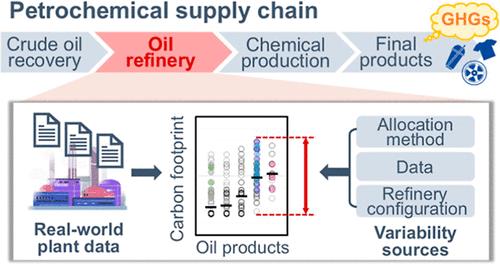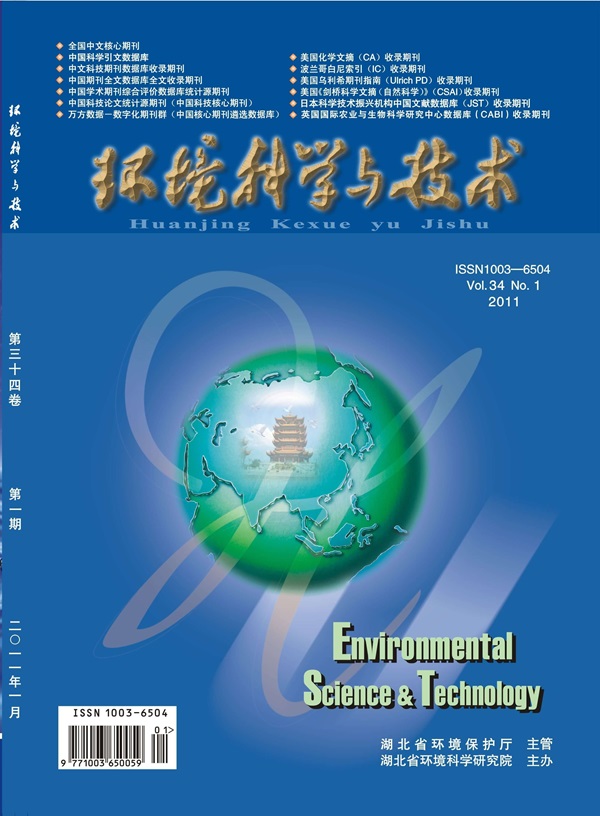Well-to-Gate Greenhouse Gas Emissions of Petrochemical Products across the Supply Chain and Sources of Variability in China
IF 11.3
1区 环境科学与生态学
Q1 ENGINEERING, ENVIRONMENTAL
引用次数: 0
Abstract
The carbon-intensive petrochemical sector plays a critical role in numerous industrial supply chains. However, existing databases lack comprehensive carbon footprint profiles for petroleum products, hindering reliable assessments of greenhouse gas (GHG) emissions associated with derived chemicals and various downstream products. This study developed a quantification method that converts the material flows of oil refineries into input–output coefficient matrices using actual plant data, which further refined process-specific GHG emission estimates and identified key sources of variability across the full spectrum of petroleum products. The results show that inconsistent allocation methods lead to 40%–80% of the variation in emission estimates, while data uncertainty has a moderate influence. Configuration heterogeneity also affects GHG assessments by altering the process mix and upstream processes─specifically, a lower proportion of straight-run oil and deeper processing of heavier fractions result in higher emissions. Additionally, the aggregation of oil-based intermediates as chemical feedstocks introduces an uncertainty range of −19% to +44% in assessing the GHG emissions of major chemicals. This underscores the importance of comprehensive GHG emission profiles and variability analysis of petroleum products in advancing reliable emission assessments and decarbonization strategies for the petrochemical industry.

中国石化产品从井到门的供应链温室气体排放及其变异性来源
碳密集型石化行业在众多工业供应链中发挥着关键作用。然而,现有数据库缺乏石油产品的全面碳足迹概况,阻碍了与衍生化学品和各种下游产品相关的温室气体(GHG)排放的可靠评估。本研究开发了一种量化方法,该方法使用实际工厂数据将炼油厂的物质流转换为投入产出系数矩阵,从而进一步完善了特定工艺的温室气体排放估算,并确定了整个石油产品范围内变化的关键来源。结果表明,分配方法不一致导致排放估算值的变化幅度为40% ~ 80%,而数据不确定性的影响较小。配置异质性还通过改变工艺组合和上游工艺影响温室气体评估──具体而言,较低比例的直馏油和较重馏分的深度加工导致较高的排放。此外,作为化学原料的油基中间体的聚集,在评估主要化学品的温室气体排放时,引入了−19%至+44%的不确定性范围。这强调了综合温室气体排放概况和石油产品变异性分析在推进可靠的排放评估和石化行业脱碳战略方面的重要性。
本文章由计算机程序翻译,如有差异,请以英文原文为准。
求助全文
约1分钟内获得全文
求助全文
来源期刊

环境科学与技术
环境科学-工程:环境
CiteScore
17.50
自引率
9.60%
发文量
12359
审稿时长
2.8 months
期刊介绍:
Environmental Science & Technology (ES&T) is a co-sponsored academic and technical magazine by the Hubei Provincial Environmental Protection Bureau and the Hubei Provincial Academy of Environmental Sciences.
Environmental Science & Technology (ES&T) holds the status of Chinese core journals, scientific papers source journals of China, Chinese Science Citation Database source journals, and Chinese Academic Journal Comprehensive Evaluation Database source journals. This publication focuses on the academic field of environmental protection, featuring articles related to environmental protection and technical advancements.
 求助内容:
求助内容: 应助结果提醒方式:
应助结果提醒方式:


